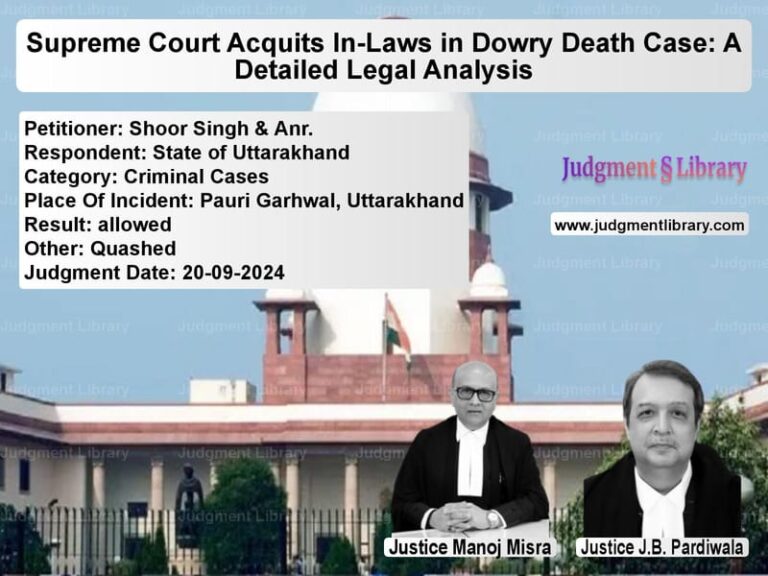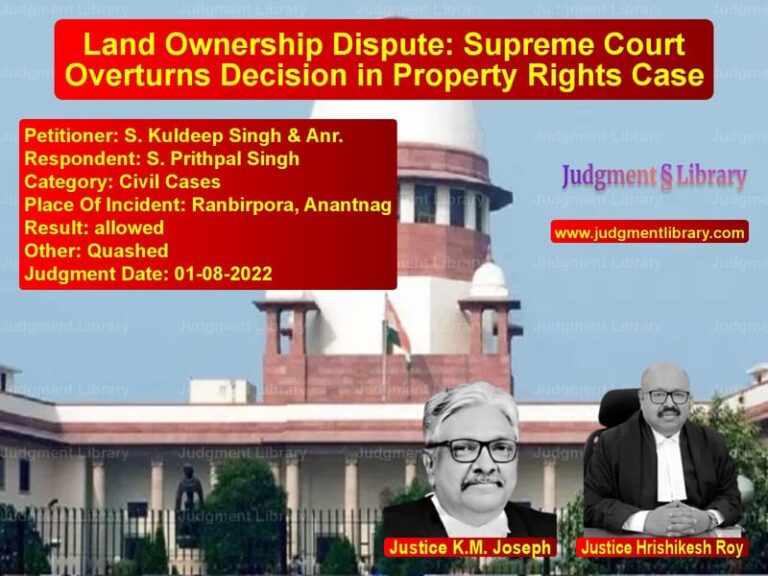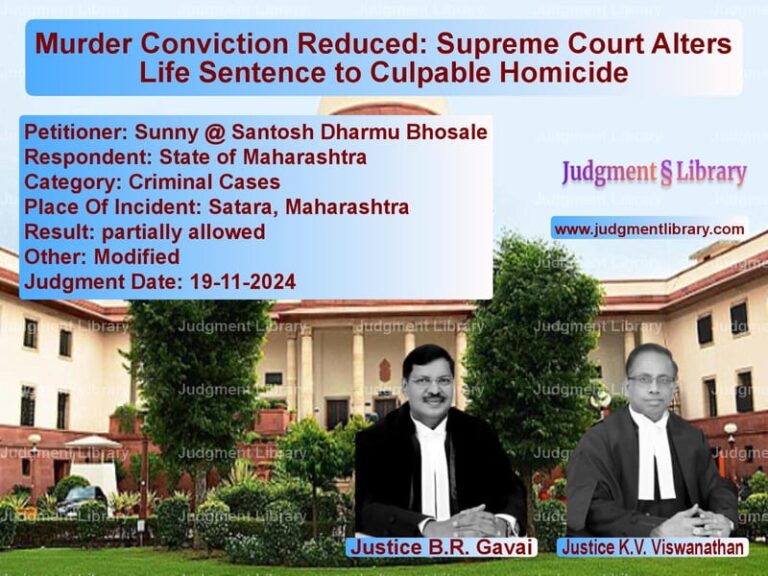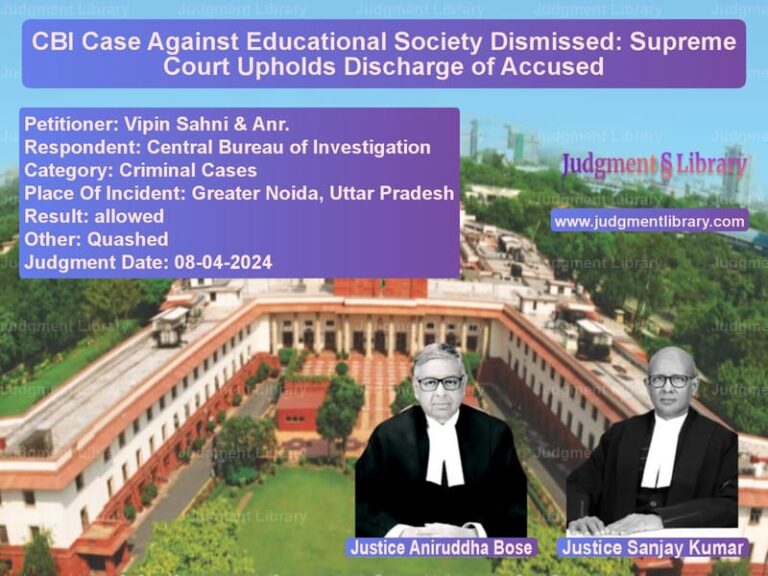Defamation Case Against Politician Quashed: Supreme Court Rules on Misuse of Section 199(2) CrPC
Defamation cases, especially those involving political figures, often raise critical questions about the balance between free speech and legal accountability. The case of K.K. Mishra vs. The State of Madhya Pradesh & Anr. involved a criminal defamation charge against the appellant, a politician, based on statements made at a press conference. The Supreme Court, in its judgment dated April 13, 2018, quashed the prosecution, ruling that the complaint was not maintainable under Section 199(2) of the Code of Criminal Procedure (CrPC), 1973.
This ruling is significant as it clarifies the conditions under which public functionaries can invoke Section 199(2) to initiate defamation proceedings and underscores the necessity of due diligence by the Public Prosecutor in such cases.
Background of the Case
The controversy arose when K.K. Mishra, then the Chief Spokesperson of the Indian National Congress (Madhya Pradesh), addressed a press conference on June 21, 2014, making allegations against the Chief Minister of Madhya Pradesh regarding the Vyapam scam. His statements, according to the prosecution, were defamatory to the Chief Minister.
On the same day, the State Government granted sanction to file a defamation complaint, and the Public Prosecutor, without independent scrutiny, lodged a complaint before the District & Sessions Judge, Bhopal under Sections 499 and 500 of the Indian Penal Code (IPC). The case proceeded to trial, and on November 17, 2017, the appellant was convicted under Section 500 IPC and sentenced to two years’ simple imprisonment with a fine of Rs. 25,000.
The appellant challenged the very initiation of the prosecution, arguing that the case was not maintainable under Section 199(2) CrPC. While his appeal against the conviction was pending before the Madhya Pradesh High Court, the Supreme Court decided to examine whether the criminal defamation complaint itself was valid.
Legal Issues Considered
The Supreme Court examined the following issues:
- Whether the prosecution under Section 199(2) CrPC was maintainable in the given circumstances.
- Whether the allegedly defamatory statements were linked to the discharge of public functions by the Chief Minister.
- Whether the Public Prosecutor exercised independent discretion before filing the complaint.
- Whether the prosecution violated the principles laid down in Subramanian Swamy vs. Union of India regarding defamation laws.
Arguments by Both Parties
Petitioner’s Argument (K.K. Mishra):
- The statements made at the press conference were political criticisms and did not relate to the official discharge of public functions by the Chief Minister.
- Under Section 199(2) CrPC, only statements affecting the public functions of a government official could be prosecuted by the Public Prosecutor.
- The Public Prosecutor failed to apply his independent mind and filed the complaint on the same day the State Government granted sanction, without examining the material.
- The conviction under Section 500 IPC was untenable since the case itself was invalid.
Respondent’s Argument (State of Madhya Pradesh):
- The appellant’s statements were false and intended to defame the Chief Minister.
- The remarks damaged the Chief Minister’s reputation, warranting prosecution under Section 199(2) CrPC.
- The Public Prosecutor acted lawfully in filing the complaint after obtaining sanction from the State Government.
Supreme Court’s Observations
The Supreme Court, comprising Justices Ranjan Gogoi, R. Banumathi, and Mohan M. Shantanagoudar, found that the prosecution was not maintainable under Section 199(2) CrPC as the alleged defamatory statements did not relate to the official functions of the Chief Minister.
Key Excerpt from the Supreme Court Judgment:
“The appointment of persons from the area/place to which the wife of the Hon’ble Chief Minister belongs and the making of phone calls by the relatives of the Hon’ble Chief Minister have no reasonable nexus with the discharge of public duties by or the office of the Hon’ble Chief Minister.”
The Court further observed:
“The Public Prosecutor, while filing cases under Sections 499 and 500 IPC, is expected to maintain independence and not act as a machine. The haste with which the complaint was filed indicates that the Public Prosecutor may not have applied his mind.”
Final Verdict
The Supreme Court ruled:
- The defamation case was not maintainable under Section 199(2) CrPC.
- The conviction under Section 500 IPC was quashed.
- The pending appeal before the Madhya Pradesh High Court was closed.
- The appellant’s bail bond was discharged, and all legal proceedings were terminated.
Impact of the Judgment
This judgment has significant implications for defamation laws and political speech in India:
- It sets a precedent that Section 199(2) CrPC can only be used for defamatory statements directly related to the discharge of public duties by a government functionary.
- It reinforces the requirement for the Public Prosecutor to act independently and not merely execute the government’s orders.
- It ensures that politicians cannot misuse defamation laws to suppress criticism and dissent.
- It strengthens freedom of speech by preventing wrongful criminal defamation cases against opposition leaders and critics.
Conclusion
This ruling is a landmark decision in protecting free speech and preventing the misuse of defamation laws by political figures. The Supreme Court has reinforced that public servants cannot invoke Section 199(2) CrPC to shield themselves from criticism that is unrelated to their official duties.
The decision also upholds judicial accountability by ensuring that Public Prosecutors exercise independent discretion when filing complaints. By quashing the defamation case, the Court has provided a strong safeguard against politically motivated prosecutions and reinforced the constitutional principle of free speech.
Petitioner Name: K.K. Mishra.Respondent Name: The State of Madhya Pradesh & Anr..Judgment By: Justice Ranjan Gogoi, Justice R. Banumathi, Justice Mohan M. Shantanagoudar.Place Of Incident: Madhya Pradesh.Judgment Date: 13-04-2018.
Don’t miss out on the full details! Download the complete judgment in PDF format below and gain valuable insights instantly!
Download Judgment: K.K. Mishra vs The State of Madhya Supreme Court of India Judgment Dated 13-04-2018.pdf
Direct Downlaod Judgment: Direct downlaod this Judgment
See all petitions in Criminal Defamation
See all petitions in Civil Defamation
See all petitions in Contempt Of Court cases
See all petitions in Judgment by Ranjan Gogoi
See all petitions in Judgment by R. Banumathi
See all petitions in Judgment by Mohan M. Shantanagoudar
See all petitions in allowed
See all petitions in Quashed
See all petitions in supreme court of India judgments April 2018
See all petitions in 2018 judgments
See all posts in Defamation Cases Category
See all allowed petitions in Defamation Cases Category
See all Dismissed petitions in Defamation Cases Category
See all partially allowed petitions in Defamation Cases Category







